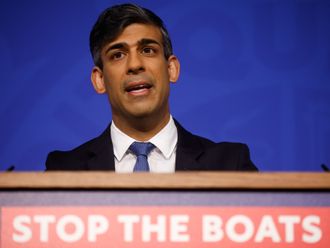
Helsinki: Finland’s prime minister-elect Juha Sipila has his work cut out for him to build a majority in parliament and revive the country’s moribund economy, observers said Monday.
Sipila, a 53-year-old self-made IT millionaire and newcomer to politics, was the big winner in Sunday’s general election when his opposition Centre Party won 49 of 200 seats in parliament.
He now faces “not necessarily long negotiations but difficult ones” to build a majority in parliament, and must decide whether to include the anti-EU Finns Party in his government, Helsinki University political science professor Tom Moring told AFP.
Tradition dictates that the largest party takes the post of prime minister and forms a government with the other largest parties to obtain a parliamentary majority.
The right-wing Eurosceptic Finns Party, also in the opposition, pulled off one of the election’s biggest surprises by becoming the second-biggest party with 38 seats.
Outgoing Prime Minister Alexander Stubb’s conservative National Coalition Party won 37 seats and the Social Democrats 34.
The government negotiations are expected to take several weeks, and Sipila has given no indication of which parties he will solicit.
A former businessman who campaigned heavily on his corporate know-how and promised to run government the way he ran his companies, Sipila will have to show proof of his touted management and negotiating skills to build his team.
The Finns Party’s strong showing is a “conundrum” for Sipila, public radio and television YLE wrote in a comment.
Helsinki University political history professor Juhana Aunesluoma told AFP that “all options are open, including the entry of the Finns Party into the government.”
Finns Party leader Timo Soini, whose affable style and folksy charisma is largely seen as responsible for his party’s success, has made it clear he wants to be in government, eyeing the influential posts of foreign and finance ministers.
Traditionally, the second-biggest party holds the finance portfolio and the third-biggest party takes foreign affairs.
It may be difficult for Sipila to agree to that.
“This is not a party constructed to be in government,” Moring said.
“I can hardly believe that ... any coalition and the Centre Party would agree to a finance minister from the Finns Party who will go to the EU and negotiate Greece and other solutions,” he said.
“This will be a very difficult question when it comes to who takes which portfolio in the coming government.”
The Centre Party also has a strong Eurosceptic faction, which Sipila, a pro-European, has tried to moderate.
Sipila has insisted there “will be no change” in Finland’s position in the Eurozone’s negotiations with Athens under his leadership.
Sipila has stressed that his future government must share a political ideology — contrary to the internal discord that paralysed Stubb’s four-party coalition.
His main task will be to get the Eurozone country’s economy back on track after three years of recession and stagnation, austerity and failed reforms.
Finland was long a top performer in the Eurozone, hailed by Germany and credit rating agencies for running a tight economic ship. But it has failed to adapt to a rapidly changing economic climate.
The two pillars of its economy, the forestry sector and technology industry led by one-time giant Nokia, have shrunk dramatically, while two of Finland’s biggest trading partners, Russia and the Eurozone, are battling their own economic worries.
Unemployment is at its highest level since 2003, at 9.2 per cent, and the country has one of Europe’s most rapidly ageing populations that it doesn’t know how to pay for.
“The Finnish situation is very difficult and it will be about a 10-year-project to get Finland in shape again,” Sipila said on election night, adding that “a combination of cuts, reforms and growth” were needed.
Faced with Finland’s serious economic woes, “the government programme will be quite difficult to create,” Aunesluoma predicted.
Sipila has vowed a series of economic reforms, including easing up on bureaucracy, tax breaks for newly-created jobs and a reform of unemployment benefits.
He has promised to create 200,000 private sector jobs in 10 years.












